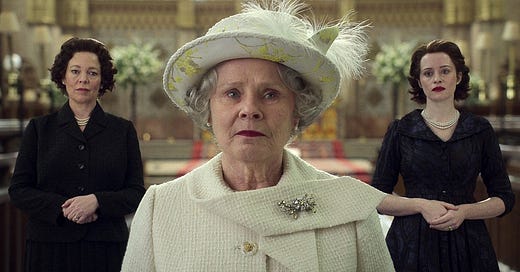Surprise!
I found myself with so many links backing up that I thought I should send them out while they’re fresh. Happy Christmas!
Helen
Did SEO Experts Ruin The Internet—Or Did Google? (The Verge)
But here’s the part where I started to feel the way I’ve felt so often in recent years, like I was losing my grip on reality: Sullivan was not the only person who tried to tell me that search results have improved significantly. Out of the dozen-plus SEOs that I spoke with at length, nearly every single one insisted that search results are way better than they used to be. And except for Sullivan, these were not people with an incentive to praise Google. If anything, these were folks who lamented how much harder it had become for them to take advantage of Google. Today, they told me, search results are just objectively more accurate. More useful. More difficult to manipulate.
This was not what I had been noticing, and this was certainly not what I had been hearing from friends and journalists and friends who are journalists. Were all of us wrong? Or engulfed in some kind of Baader–Meinhof frequency bias delusion? Had I been researching a nonexistent problem? Were Google results actually amazing? Truly, I had lost the plot. Was the premise of this piece completely off? Was I the asshole who deserved to be attacked by an alligator?
A couple of weeks ago, some guy who seemed like the living personification of LinkedIn was boasting on Twitter about his amazing SEO strategy—feeding a legit website’s copy into an AI, which rewrote it just enough, and then posting it on an identikit website which would then farm advertising revenue. He recounted this like it made him sound like a business genius rather than a parasite.
That kind of thing is, I’m guessing, why so many of us are predisposed to think that SEO people are the worst kind of scammers—successful scammers. But have they actually made the internet worse?
The Crown Has Nothing Left To Say (The Atlantic)
Audiences fell in love with The Crown because its early seasons evoked a lost time and explored a single question. At only 25 years old, a woman born before the invention of television—a woman born into a dying empire, who never went to school, who grew up in a castle during wartime—became the ruler of a fractious kingdom, in a world that was just about to invent miniskirts, pop music, and the concept of the teenager. Would she, and the monarchy, survive?
But as The Crown’s scope has drawn closer to the present, it has lost the useful distance of history as well as its grandeur, and its sense of permission. To a Millennial like me, the soundtrack to the final season was a nostalgic delight—The Cardigans! The Chemical Brothers! “Tubthumping,” by Chumbawamba!—but it underscored the questionable ethics of fictionalizing the darkest moments of living subjects. While my own friends were smoking their first cigarettes to the New Radicals’ “You Only Get What You Give,” William and Harry were being persecuted for acting like normal adolescents, only months after their mother’s death. The Crown condemns the media’s intrusion into private grief but forgives itself for the same offense.
I wrote about the whimpering end to The Crown. It would have been better to have ended it with Diana’s death, I think.
Bluestocking Recommends
It took me about a month to finish Barbara Kingsolver’s Demon Copperhead—a retelling of David Copperfield in 1990s Virginia, at the start of the opioid epidemic—but I loved every minute of it.
I also watched The Electrical Life of Louis Wain (Netflix), a film by Will Sharpe—the one with the incredible abs in White Lotus—about cats, grief and mental illness. Features Benedict Cumberbatch, Claire Foy and some incredible cameos (they probably saw his abs).
You probably know by now how much I love Great Lives, and this episode with film editor Walter Murch, on ousted Iranian leader Mohammad Mossadegh, is an example of why. I am now marginally more informed about the Middle East.
Quick Links
“In some cases, the trainer’s vocabulary seemed drawn from even more distant shores: “I will not project colonial, capitalist, or patriarchal concepts on my dog,” one post read, in between tips on leash reactivity and separation anxiety; “don’t gaslight your dog,” another urged.” The culture wars have come for dog-training! Should you punish your dog to keep it in line? One of the observations in this—that “woke” and “antiwoke” have become deeply gendered concepts—is something I’ve been thinking about a lot lately. (New York Times)
“Unfortunately, when you make the real world a game, people start treating other people like NPCs.” Why the immersive theatre company Punchdrunk’s hookup with the maker of Pokemon Go fell apart (Polygon).
“I know many (most?) of the people involved in most of these companies. And, yes, we have all made a lot of dumb choices and bad decisions. But that was true during the fast-growth stage of podcasting, too.” Adam Davidson really crunches the numbers on the economics of the podcasting boom, when a load of big names piled into the industry as the latest extension to their brand (AdamJDavidson.com)
That piece links to a Daily Beast article on the troubles inside Pushkin, co-founded by Malcolm Gladwell, which also produces Michael Lewis’s podcast. This happened at a staff meeting: ‘“When asked what diversity meant to him, Gladwell replied: “Here’s a question: If you’re a Republican, raise your hand.” When no one raised their hand, Gladwell remarked, “I would think that a diverse company should have some Republicans in it.” When staffers pushed back, noting the lack of diversity among Pushkin’s senior leadership, Gladwell, who is half Black, responded, “Hello, I don’t count?”’ I think Sir Humphrey Appleby would have called this approach “courageous”.
“The Hofman Wobble”: a semi-fictional story by Ben Lerner about information, Wikipedia and crickets (Harpers).
“In 2022, the researchers Lucy Foulkes and Jack L. Andrews coined the term prevalence inflation to describe the way that some people, especially young people, consume so much information about anxiety disorders that they begin to process normal problems of living as signs of a decline in mental health.” (Derek Thompson, The Atlantic)
“Trying to be helpful, one of the top newsroom editors urged me to start attaching trigger warnings to pieces by conservatives.” James Bennet on the events that led to his ousting from the New York Times in 2020 (Economist).
See you in 2024 —and please remember: do not to gaslight your dog!






Helen, your newsletters never fail to put a smile on my face. Thank you.
the audiobook of demon copperhead is brilliant, the narrator’s voice is perfect for demon. like you, i took quite a while to read it, it’s pretty hard going often, and i needed breaks.